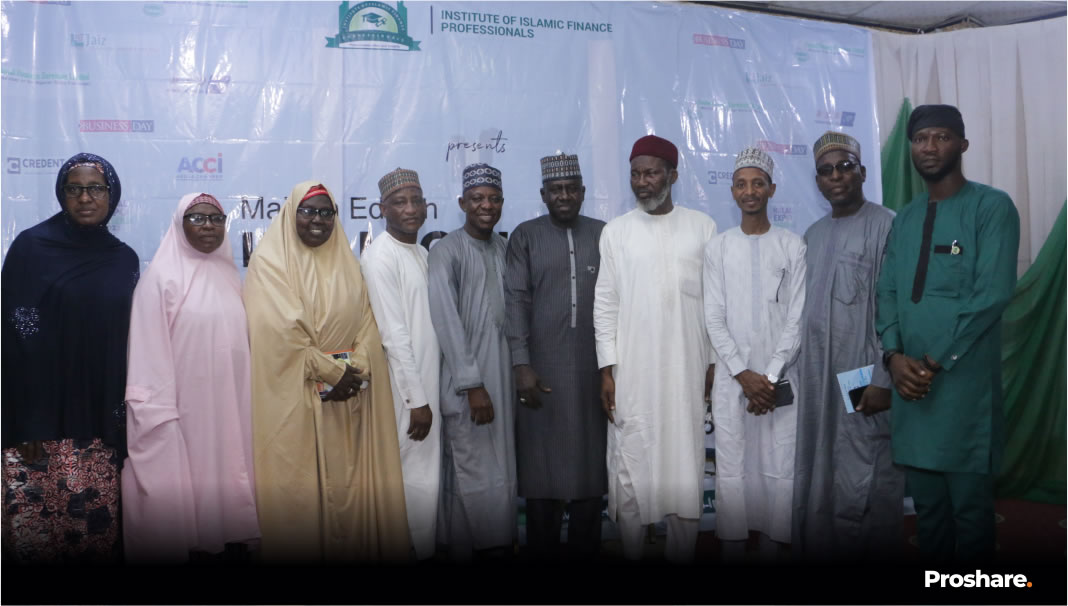The Institute of Islamic Finance Professionals, IIFP Nigeria's pioneer Islamic Finance training institution, hosted its 2022 bi-annual executive membership training and inducted ten members. It brought together scholars, experts, stakeholders, facilitators, and members for the June 2022 executive membership training.
This was part of efforts to build capacity, promote Islamic financial practices, and advocate best practices in the Islamic Financial sector in Nigeria and globally.
The training featured facilitators from the non-interest finance industry in the person of Mrs. Oyindamaola Dada, MD/CEO, Caravan Nigeria, Dr. Basheer Oshodi, CEO and Co-Founder, Trustbanc Arthur and Dr. Jubril Salaudeen, Director Citiserve Limited.
Giving the first presentation, Mrs. Dada focused on the history of Islamic finance, fundamentals of Islamic finance, Basic principles of Shariah, Islamic Economics, and Islamic Business Ethics.
According to her, Islamic finance started in the 7th century when the Muslims in the Arab world developed massive local and international commercial trade. Also, in the 19th century, nearly every Muslim country adopted a western-inspired banking system, while there were several attempts by countries like Pakistan to start non-interest banking.
Speaking further on the history of Islamic finance, she noted that in 1963 the first known Islamic financial institution, Mit Ghamr Islamic Savings Bank, was pioneered by Ahmad El-Naggar in Egypt.
She also gave an overview of the evolution of Islamic Financial Institutions, significant events and the timelines of their establishment, which include:
- 1963- The pilgrim fund corporation in Malaysia, Tabung Hajj, was established.
- 1971 –The Nasser Social Bank was established in Egypt, focusing on banking for the low-income group.
- 1973- The conference of the finance ministers of Islamic countries, OIC held in Jeddah.
- 1975- The Islamic development IsDB was established.
- 1977- The first privately owned Islamic bank opened in UAE.
- 1977- Faisal Islamic Bank Egypt and Sudan, Kuwait Finance Houses were established.
- 1980- Islamic Banks started opening in Western European countries; Pakistani, Iranian and Sudanese governments adopted the Islamic Banking system for all their Banks; it widened to include Asset Management, Takaful among others.
- 1990- Regulatory bodies were established, such as; AAOIFI, IFSB and IIFM.
Looking at the development of the ecosystem in Nigeria, she noted that Habib Bank was licensed in 1992 and began operating as a non-interest bank in 1996, but it did not last long. In 2012, Jaiz Bank emerged as the first full-fledged non-interest bank with its first office in Abuja, while in 2014, Sterling Alternative finance got the non-interest banking window license.
TajBank 2019 was licensed as the second fully-fledged NIB, and in 2021 Lotus Bank came on board as the third fully-fledged NIB in the country. Sterling Alternative Finance also got its license, and almost all the regulatory institutions in the financial market have made provisions for alternative finance products. Central Bank of Nigeria, Securities and Exchange Commission, National Insurance Commission, National Pension Commission and National Deposit Insurance Commission, amongst others.
Speaking on fundamental principles of Islamic finance, she highlighted; risk sharing- profit and loss sharing, prohibition of unfairness & injustice, prohibition of riba(interest), prohibition of Gharar (Uncertainty), prohibition of Maysir (Gambling), prohibition of monopolies, prohibition of unethical activities, and encouragement of real economic activity.
Providing further insight on the financial structures in Islamic finance, she mentioned trade financing products such as; Murabaha, Bai Muajjal, Musawwamah, Salam and Istisna. The Lease based-financing products; are Ijarah, Ijarawa Iqtina, Ijara Muntahia Bi Tamleek, Ijara, Mawsufa Fil Dhimma. At the same time, partnership-based Financing includes; Musharakah and Mudarabah. Qard Hassan- and service-based products; Kafala, Wakalah.
According to her, the basic principle of Shariah or Islamic law is the relationship between Man and God and the relationship between fellow man. Mrs. Dada noted in her presentation that the Islamic economic system is the collection of rules, values, and standards that organizes economic activities under Shariah principles.
According to her, the objectives of the Islamic economic system include:
- Economic stability for individuals, society, and country
- Optimum resource usage
- Fair distribution of wealth
- Upholding individual freedom
- Equal rights and opportunities
- Justice and cooperation
- Destroying all causes of corruption
- It must bring proper balance between capital and labour
- Discouraging the concentration of wealth in the hands of individuals or a few groups
On his part, Dr. Basheer Oshodi, CEO/Co-Founder, Trustbanc Arthur speaking on 'Principles And Operations of Islamic Financial System,' asserted that the purpose of shariah is to touch human lives positively.
He cited the population of Nigeria's out-of-school children in 2012, which was 3.5m and increased to 19m in 2019, of which most are Muslims.
The expert acknowledged that the practice of Maqasid Al Shariah is still globally shallow, thereby causing poverty. He added that preserving prosperity and expanding wealth are part of Maqasid; putting this into an Islamic finance model would improve economies.
He believed that money is not a commodity but the product of social convention, having a purchasing power derived mainly from the sovereignty against the intrinsic value of other goods.
According to him, the Nigerian banking sector has achieved tremendous growth and experienced diversification of products, including non-interest compliant products. Despite the growth, the banking sector has witnessed high Non-performing Loans and NPLs.
Dr. Oshodi believed that the alternative finance industry, which includes Islamic Banking, is a viable tool for funding businesses and creating economic opportunities.
In his presentation on 'Islamic Social Welfare,' Dr. Jubril Salaudeen, Director of Citiserve Limited, described it as the provision of financial services to achieve social protection of the poor, education, collective investments, microfinance, social enterprise finance and outcome-based philanthropy.
According to him, Muslims are the most financially excluded across the world. The objective of Islamic social finance is to support the needy and uplift them from poverty by paying 2.5% of their income.
He charged Nigeria's Zakat foundations to structure 'Zakat' payments, and Nigerians should continue paying it. Other Islamic social finance instruments are Sadaqat, Waqf, and Qard-ul-Hassan.
The President of the Institute, Prof. Tajudeen Yusuf, in his vote of thanks, stated that the motive of the training was to deepen Islamic finance in Nigeria and across the world.
"It requires a lot of dedication, commitment, and passion for contributing our quota to the growth and development of Islamic finance."
He pledged that the Institute would continue to connect with the members and individuals and charged them to continue to promote Islamic finance, be it in their transactions, interaction, place of work and areas of interest, for more Nigerians to benefit from its value.
He congratulated the inductees and implored them to make other Nigerians embrace Islamic finance, as it is open to Muslims and non-Muslims.
The Registrar, Mr. Monsuru Musa, said the Institute of Islamic Finance professionals was committed to empowering Muslims and the public about Islamic finance.
He assured all the stakeholders that the IIFP would continue to train people to bridge the manpower in the Islamic finance industry.
The event featured the presentation of membership certificates by the President of the Institute.
 Lagos, NG • GMT +1
Lagos, NG • GMT +1











 1189 views
1189 views














 Sponsored Ad
Sponsored Ad
 Advertise with Us
Advertise with Us









